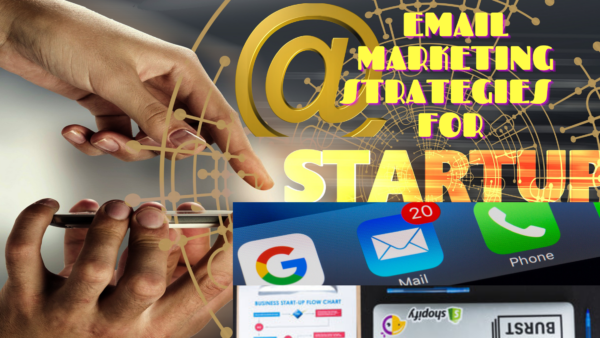The Email marketing strategies for startups give us a clear insight into the definition of email marketing strategies. and the marketing strategy adopted by startups to drive the marketing of their business
For start-ups, email marketing can seem a little daunting. Email is an expansive marketing tool in terms of design, content and strategy. The Good Marketer’s found Tom Welbourne explains how marketers can optimize their emails.
What is the definition of an email marketing strategy?
An email marketing strategy is a collection of procedures that a marketer determines and implements in order to attain specific marketing objectives using email marketing. For brand marketing, this strategy provides firms with a direct line of communication with prospects and customers.
For you to have a better understanding of the definition of an email marketing strategy you can read through what is email marketing in 2022. terms and role
There has been an incredible increase in the number of email users. By the end of 2022, there will be more than 4.2 billion users.
Why These Local Email Marketing Strategies Could Revolutionize Your Business #emailmarketing #localbusiness #localemailmarketing https://t.co/CIv1xkfTr4 pic.twitter.com/A4p0wLkKbt
— Jeff Bullas (@jeffbullas) March 30, 2022
IMPORTANCE OF INTEGRATING EMAIL MARKETING STRATEGIES INTO STARTUPS
The significance of using email marketing strategies is to help your startup succeed. It is a terrific approach to do.. Through the use of email templates, email marketing services or email service providers.
The use of email marketing strategies helps in reaching out to potential customers and creating brand awareness.
In fact it is one of the best marketing tactics used to send out a mass email to prospective customers by using a good email marketing tool and email marketing software.
To take your business to the next level, you need a targeted email list to control your user’s information.
It’s critical to include email marketing in your marketing mix because it gives the best ROI.
Also, emails in your digital marketing toolbox will allow you to reach a larger target group. That is ready to buy your product.
As a result, your website traffic will improve, and your sales. And will increase, and your income will increase. What if I told you..
It is the most cost-effective digital marketing tactic that produces excellent outcomes.
As a result, it’s no surprise that over 80% of an email campaign for content marketing relies on email marketing automation.
Furthermore, this will go a long way to help startups whether you are in the niche of social media marketing, affiliate marketing or customer engagement desk.
EIGHT MAJOR EMAIL MARKETING STRATEGIES
1. TO BUILD A GOOD EMAIL LIST
Before you begin your email marketing campaign, this is the first and most important step. Building This is one important email marketing strategy that helps to generate a customer list. Going by the saying that, there is money in the list in email marketing.
After all, without a valid email list, email marketing would be impossible. Your email list could be built over time by using your website, blog, or other marketing channels.
An email list is a collection of email addresses gathered over time. It can be via your blog or website, as well as other marketing channels.
People who subscribed to your mailing list receive promotional emails, and newsletters. These. are represented by these email addresses.

2. MAKE EMAIL CONTENT OF EXCELLENT QUALITY
. Your email marketing efforts will fail if you do not include relevant content. Good content that meets the need of your subscriber is another good email marketing strategy to win over customers.
Your subscribers joined your mailing list with the hopes of receiving valuable information. Increased email open rates result from high-quality content. To generate a positive first impression on buyers who are unfamiliar with your business.
it is necessary to ensure that the email content is outstanding and appealing. You won’t succeed with email marketing if the content isn’t compelling. People joined your mailing list to get value and solutions from you. The use of email marketing strategy in any business organization is inevitable.
Hence the goal of which is to provide helpful information. It promotes the opening of emails. Every subscriber is looking for a solution to a problem. Thus be the answer by offering helpful information.
3. THE USE OF EMOJIS AND VIDEO WITHIN THE CONTENT
Using emojis and videos within the content or even the subject lines is a simple method.
These elements help to make an email more interactive and engaging for readers.
Let’s look at some intriguing emoji facts. In your email subject lines, use attractive videos and related emoticons if possible. Why? These marketing assets will improve the interactivity and appeal of your emails
Take a look at the statistics on email marketing. Emojis in mobile push notification campaigns boost open rates by 85%. If you used emojis in your subject lines, almost 60% of recipients would open your emails.
4. MAKE YOUR EMAILS MOBILE-FRIENDLY
Make sure your emails are mobile-friendly.. So, why should you make your email mobile friendly? The solution is straightforward. In the year 2019, mobile devices used to open 49% of emails.
A person in the United States spends up to 5.4 hours on their mobile device on average. And more than 70% of them use it to look for information.
As a result, your subscribers are always connected on their cell phones. Thereby, making it easy for them to open an email from a mobile device. This drive-through email marketing strategy has made most marketers to focus on the market in USA
Various mobile technologies also assist you in gaining access to your subscribers.
This includes the following: Interests and purchasing habits Age Geolocation, for example. You can build targeted and personalized email messages by using the information above.
The ideas stay the same, despite the fact that the figures may differ anyway. But based on the research investigation. We have included a list of the finest email marketing tools, which can assist you to get the best solutions.
5. THE USE OF CALL TO ACTION
To link an email marketing campaign to an online application. CTA buttons employed. CTA buttons in email campaigns aren’t for driving conversions. they’re also useful tool.
They are used to determine a customer’s level of confidence in your business. They’ll only click the CTA tab if they’re interested in learning more after reading the email.
The amount of clicks on the CTA button provides marketers with indicated interest. And also enables them to have the effective marketing plan they need.
Email marketing strategy example 2

6. RUN A/B TEST
Run A/B tests Because you’re new to your business,. Thus you’ll need to experiment with techniques to find the one that works best. for you. You’ll send two or more versions of the same email to random users in A/B testing.
Analyzing the email’s conversion and open rates is quite important. This will help you figure out which method is the best for your company.
7. PERSONALISE YOUR EMAIL
This is the practice of creating a product or service that meets the needs of your target audience.
This is marketing customization.
This strategy is better when it comes to designing email messages. This email marketing strategy entails keeping your potential buyer in mind. In today’s marketing landscape, customization is one of the important elements of success.
It is s so powerful that in the United States, more than 90% of customers prefer personalized content.
Personalization is a great marketing tactic. Because it allows you to target your buyer personas better. Email customisation has many advantages, including.
An increase in the number of people who open their email. Increases the amount of money made and the number of people who buy something. Increases the likelihood of a customer sticking with a particular brand.
8. TESTIMONIALS AND REFERRALS
Customer recommendations are critical for a starting company. since they help to establish confidence among potential clients.
How your first customers refer you to others will determine the success of your startup.
You can urge your clients to tell their friends and family about their experiences. with email marketing.
However, you can read more about essential email marketing strategies for startups . As organizations evolve there is always the need to review these strategies
THE BOTTOM LINE
For organizations that use email marketing strategies right, it creates significant returns. Organizations can use email marketing services to perfect most of their human effort.
So this blog has clarified any email marketing ambiguities you may have.
Currently, artificial intelligence is being moderately used in email marketing. However, it has the potential to change the face of email marketing altogether. Incorporating AI will give a competitive advantage to small and medium-sized firms. With Big Data and AI, marketers can analyze multiple data sets from various social media platforms to create highly personalized emails for their subscribers.
Some email marketers are already using AI to create effective subject lines. In the future, AI will be used to generate content, optimize survey results, maintain the hygiene of the email list and reduce the send time of emails.
CONCLUSION
Effective email marketing strategies for startups, such as the ones we’ve discussed? This can help you generate more leads, build loyal customers, increase sales
And convert more prospects to become customers. What are you waiting for? Most of the email marketing campaign examples were straightforward.
But, there is a catch. We live in an era where everything is automated. So, why undertake the monotonous, time-consuming activities by yourself?
Most of the tactics listed above are use Customer Relationship Management (CRM) software. But, most CRM software can cost thousands of dollars per year. This is eating into your marketing budget.


